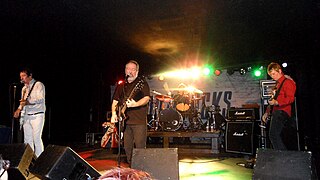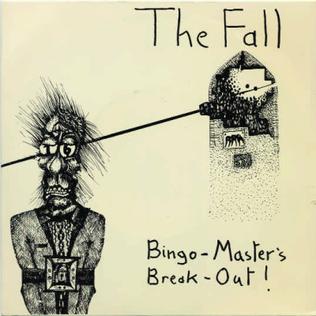Related Research Articles

Buzzcocks are an English punk rock band formed in Bolton, England in 1976 by singer-songwriter-guitarist Pete Shelley and singer-songwriter Howard Devoto. They are regarded as a seminal influence on the Manchester music scene, the independent record label movement, punk rock, power pop, and pop punk. They achieved commercial success with singles that fused pop craftsmanship with rapid-fire punk energy. These singles were later collected on Singles Going Steady, an acclaimed compilation album described by music journalist and critic, Ned Raggett, as a "punk masterpiece".

James Martin Hannett, initially credited as Martin Zero, was a British record producer, musician and an original partner/director at Tony Wilson's Factory Records. Hannett produced music by artists including Joy Division, the Durutti Column, Magazine, John Cooper Clarke, New Order, Orchestral Manoeuvres in the Dark and Happy Mondays. His distinctive production style embraced atmospheric sounds and electronics.
Big Flame were a post-punk/indie rock three piece band, based in Manchester, England, and active from 1983 to 1986. The members were Alan Brown, Greg Keeffe (guitar) and Dil Green (drums). After a debut EP ("Sink") on their own Laughing Gun label, they joined the Ron Johnson roster for a series of mid-1980s singles as well as an appearance on the NME's C86 compilation.

Howard Devoto is an English singer and songwriter, who began his career as the frontman for punk rock band Buzzcocks, but then left to form Magazine, an early post-punk band. After Magazine, he went solo and later formed indie band Luxuria.

Pete Shelley was an English singer, songwriter and guitarist. He formed early punk band Buzzcocks with Howard Devoto in 1976, and became the lead singer and guitarist in 1977 when Devoto left. The group released their biggest hit "Ever Fallen in Love " in 1978. The band broke up in 1981 and reformed at the end of the decade. Shelley also had a solo career; his song "Homosapien" charted in North America in 1981 and 1982.
Manchester's music scene produced successful bands in the 1960s including the Hollies, the Bee Gees and Herman's Hermits. After the punk rock era, Manchester produced popular bands including Joy Division, New Order, The Smiths and Simply Red. In the late 1980s, the ecstasy-fuelled dance club scene played a part in the rise of Madchester with bands like the Stone Roses, Inspiral Carpets and Happy Mondays. In the 1990s, Manchester saw the rise of Britpop bands, notably Oasis.
Ludus was a British post-punk band formed in Manchester in 1978, which featured artist, designer and singer Linder Sterling. It played jazz-, avant-garde- and punk- oriented material. The band influenced singer Morrissey, later of The Smiths and a solo artist, who remains one of the group's most vocal fans.
Blue Orchids are an English post-punk band formed in Manchester in 1979, when Martin Bramah left the Fall, after playing on the band's debut album Live at the Witch Trials. Christened by Salford-based punk poet John Cooper Clarke the band recorded for Rough Trade and acted as backing band for the Velvet Underground's Nico before a 25-year period of intermittent activity and fluctuating line-ups.

Stephen E Diggle is an English guitarist and vocalist in the punk band Buzzcocks.

Spiral Scratch is an EP and the first release by the English punk rock band Buzzcocks. It was released on 29 January 1977. It is one of the earliest releases by a British punk band. The EP is the only Buzzcocks studio release with original singer Howard Devoto, who left shortly after its release to form one of the first post-punk bands, Magazine.
Dislocation Dance are an English post-punk band from Manchester, England. The group's original line-up is obscure; their first EP, a self-titled 7" as a co-release between two labels, Delicate Issues and New Hormones recorded in May 1980, lists its line-up as 'B' on vocals and keyboard; 'Don' on drums; 'Ian' on vocals and guitar, and 'Paul' on bass, but also mentions 'Past members of the band' as Rod Bloor, Kathryn Way, Tim Glasser, Ian Rogers and Julie Gask.
The Diagram Brothers were an English post-punk band from Manchester active between 1979 and 1982. The band comprised Andy Diagram, Fraser Diagram, Lawrence Diagram (guitar), Jason Diagram (bass), and Simon Diagram (drums). Andy Diagram was also a member of Dislocation Dance from 1978 to 1982, and in 1985, and was a member of The Pale Fountains and James.
The Distractions are an English punk rock/new wave band from Manchester, England.

The Teardrops were an English punk/new wave band formed in Manchester, England, in 1978. The founders and always the core of this band were Trevor Wain, John Key and Jimmy Donnelly with various good friends from the Prestwich music scene:- Buzzcocks bassist Steve Garvey, members of The Fall; Martin Bramah, Karl Burns and Tony Friel and former member of V2 Ian Nance, as well as occasional contributions from Dave Brisbane, Helen Harbrook, Dave Price and Rick Goldstraw.
John Maher is a British musician who was part of the punk and new wave scenes in Manchester, England, most notably as the drummer with Buzzcocks.

Minutemen were an American punk rock band formed in San Pedro, California, in 1980. Composed of guitarist/vocalist D. Boon, bassist/vocalist Mike Watt, and drummer George Hurley, Minutemen recorded four albums and eight EPs before Boon's death in an automobile accident in 1985; the band broke up shortly thereafter. They were noted in the California punk community for a philosophy of "jamming econo"—a sense of thriftiness reflected in their touring and short, tight songs as well as their eclectic style drawing on hardcore punk, funk, jazz, and other sources.
James Richard Boon is the former manager of Buzzcocks and boss of the record label, New Hormones.
Biting Tongues were a post-punk band formed in Manchester, England in 1979, whose members went on to join Simply Red, Yargo, and 808 State.

Bingo-Master's Break-Out! is the debut EP by English post-punk band The Fall. It was released on 11 August 1978 through record label Step-Forward.

"Rip It Up" is a song by Scottish indie pop band Orange Juice, released in 1983 as the second single from their 1982 album of the same name. The song became the band's only UK top 40 success, reaching No. 8 on the chart. "Rip It Up" signalled a departure from the sound of the band's earlier singles, with Chic-influenced guitars and using a synthesiser to create a more disco-oriented sound.
References
- ↑ Perry, A. in Mojo 95, P. 90
- ↑ Reynolds, Simon. Rip It Up and Start Again: Postpunk 1978-1984. Faber and Faber. 2006.
- ↑ Brown, T. et al. The Complete Book of the British Charts (Omnibus Press 2002), p. 178
- 1 2 Reynolds, pp.28
- 1 2 3 "The full story | Indie Originals: The New Hormones Story". Newhormonesinfo.com. Retrieved 30 June 2014.
- ↑ "The Secret Public | Indie Originals: The New Hormones Story". Newhormonesinfo.com. Retrieved 30 June 2014.
- ↑ "Factory's shadow | Indie Originals: The New Hormones Story". Newhormonesinfo.com. 3 February 2008. Retrieved 30 June 2014.
- ↑ Azerad, Michael. Our Band Could Be Your Life. Bay Back Books. 2001.
- ↑ "Features | Tome On The Range | An Extract From John Robb's Manchester Music City 1976-1996". The Quietus. Retrieved 30 June 2014.
- ↑ "Shadowplayers: Factory & Manchester Post-Punk - Sounds for Sure - Used LP's, CD's and more..." 30 March 2012. Archived from the original on 30 March 2012. Retrieved 22 October 2020.
- ↑ Melody Maker , 28 February 1981
- ↑ "The Beach Club | Indie Originals: The New Hormones Story". Newhormonesinfo.com. Retrieved 30 June 2014.
- ↑ Reynolds, pp.26
- ↑ "The short story | Indie Originals: The New Hormones Story". Newhormonesinfo.com. 3 February 2008. Retrieved 30 June 2014.
- ↑ "newhormonesdiscography". Sound.jp. Retrieved 30 June 2014.
- ↑ "Discography | Indie Originals: The New Hormones Story". Newhormonesinfo.com. 3 February 2008. Retrieved 30 June 2014.